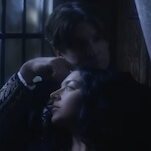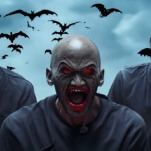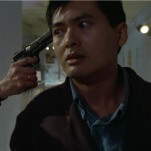It occurs to me that I never bothered to explain the terms that I've been putting after each movie, or why I'm putting them there. Part of the purpose of this journal is let those of you who care about "awards season" know what the studios are pushing. So if you see "commercial screening" or "commercial DVD" next to a title, you'll know that's a movie I paid for and watched on my own time, not at studio bidding. An "Academy screener" is a specially marked DVD sent to me by a movie's publicists expressly for best-of-list consideration (ditto a "critics' screening," though I haven't been to any of those yet this season). A "screener DVD" was sent for me to review not necessarily for best-of lists, but for our regular weekly coverage. (A regular screener doesn't come in a special box with with "for your consideration" text all over it…that's the only real cosmetic difference.) But sometimes "commercial DVD"s and "screener DVD"s are sent by publicists for best-of-list consideration, and if that's the case, I note it. Make sense? Anyone really care? Probably not on both counts
Now on to the movies…
Saturday, November 24th
Enchanted (commercial screening): Believe it or not, I'd been looking forward to this live-action riff on animated fairy tales, because I was hoping for a starmaking performance by Junebug charmer Amy Adams, as well as some clever and/or resonant exploration of fantasy formulas. As it happens, Adams is quite good, though her cartoon-princess-adrift-in-NYC character is one-dimensional by design, and as a result isn't memorable enough to be iconic. And the Disney folks seemed to be working desperately hard to make her iconic. I don't know anything definitive about went on behind the scenes, but based on what's on the screen, I picture a roomful of accountants pointing at bar charts that show the massive popularity of the Disney Princess product line and the phenomenal cultural impact of High School Musical. The obvious next step for Disneycorp? More princesses and more tween-friendly musicals. For much of Enchanted's running time, the movie feels thrown-together, as though a committee cooked up the basic premise then gave it a quick once-over, accepting just about any half-decent idea as doable. Enchanted's tone shifts wildly, sometimes giving old-school Disney musical styles a kinky twist–like when Adams cleans up Patrick Dempsey's New York apartment with the help of pigeons, rats, flies and cockroaches–sometimes showing how the sunshine-y values of Disney heroines are foolish and naive, and sometimes buying fully into the whole handsome-prince-and-distressed-damsel dynamic. Amidst this crazy patchwork, some scenes work like gangbusters. (My favorite is Adams' big Central Park number, with which everybody she meets joins in, to Dempsey's chagrin.) Others are ungainly and underthought, like the climactic action scene, which plays like it was vetted by a freshman Women's Studies class. Because there's far more of the latter than the former, my store of pre-release goodwill for Enchanted got depleted fairly fast. Primarily though, my frustration can be chalked up to a nagging feeling that this concept could've been developed into something smarter and fleeter.
Grade: C+
On the list? Never ever.
Sunday, November 25th
Gone Baby Gone (screener DVD, sent for awards purposes): It's hard to talk much about this movie without venturing too far into spoiler territory, and given that half the value of Gone Baby Gone is in its precise, twisty storytelling–kudos to Dennis Lehane's original novel, surely–that leaves a lot of potential praise off the table. So instead I'll give it up to director Ben Affleck for staying out of the way of his actors and his script, and letting the events surrounding a south Boston kidnapping play out, and go where it needs to without a lot of distracting visual flash or hammy overacting. The movie is anchored by Affleck's brother Casey, playing a private investigator who somewhat arrogantly stays true to his underclass roots, taking pride in his ability to speak the lingo of his local drug dealers and barflies. And it's that pride that subtly drives Gone Baby Gone's action, though the movie never makes too big a deal of it. Affleck opens with a montage of people hanging out on the street and a voiceover monologue about how our identities are forged by the arbitraries of where we were born, and it ends by testing that philosophy in the crucible of an impossible choice. Cruel symmetry. Terrific movie.
Grade: A-
On the list? Yes baby yes. Somewhere between 6 and 10…position to-be-determined.
Monday, November 26th
The Hoax (commercial DVD, sent for awards purposes): This breezy dramatization of author Clifford Irving's real-life attempt to pass off a forged autobiography of Howard Hughes should be a lot more fun than it is, or at least have more to say about class barriers and the pretenses people use to get around them. But although Richard Gere is fully in his element as the slick bullshitter Irving, director Lasse Hallstrom doesn't maintain a consistent tone. Sometimes the movie is a spirited romp through the early '70s publishing world, sometimes it's a wacky caper movie–with overly broad comic relief by Alfred Molina, playing Irving's insecure right-hand man–and sometimes it's a surreal political thriller, trying to make some point about Hughes' connection to the corruption of President Nixon. And because this is a movie about lies and the lying liars who tell them, I found the obviously fictionalized elements of the Irving/Hughes saga to be really distracting, in large part because the movie doesn't openly acknowledge them as fake (unlike, say, Confessions Of A Dangerous Mind). The best parts of The Hoax deal with how Irving struggles to maintain a jetsetting lifestyle and the approval of the moneyed, but the movie never tries to expand that character trait into anything deeper. Instead it just…trails off.
Grade: C
On the list? Only if that list has been forged.
Hot Fuzz (commercial DVD): I should admit up top that I haven't yet seen Shaun Of The Dead, and I've only seen one episode of Spaced, so I won't be able to weigh in on where Hot Fuzz ranks in the Pegg/Wright/Frost cosmology. (Though I do plan to catch up with the earlier work when I can.) Instead I'll just say that Hot Fuzz wasn't quite what I expected, and yet I enjoyed it regardless. I was expecting something far more riotous and zany, and not this tightly plotted, character-driven comedy about pastoral life in the UK. Aside from the pop culture references and the explosively gory finale, a lot of what's in Hot Fuzz could just as easily fit into The Vicar Of Dibley. And I don't mean that as an insult. While Hot Fuzz struck me as more of a genteel comedy of manners than an edgy laugh-fest, I also found it more fluid than a lot of recent movie comedies (which seem to prize intermittently ecstatic highs over consistent filmmaking and storytelling). The movie runs a little long, but it's never a chore to watch. And I especially liked how the cameo appearances by contemporary British comedy icons–Martin Freeman! Steve Coogan! Bill Nighy! Stephen Merchant!–affirm Hot Fuzz's down-home soul.
Grade: B+
On the list? Somewhere between 18 and 22.
Tuesday, November 27th
Talk To Me (Academy screener): This biopic of DC radio legend Petey Greene suffers from some of the same cute-ification as The Hoax in the way it embellishes real life to make it look phonier. There's nothing inherently wrong with jumbling chronologies and simplifying situations in order to tell a larger truth, but Talk To Me follows a fairly conventional biopic strategy. Ambitious man finds fame, then self-destructs, then reaches a somewhat happier place, the end. What distinguishes Talk To Me are the performances–especially Don Cheadle as the erratic Greene–and the movie's exploration of how demagoguery can be both useful and dangerous. There's something undeniably bracing about Greene in the early going, as he ignores all the rules of propriety on radio because, "I ain't saying nothin' that black folks don't already know." But there's a limit to what pure unfiltered "truth" can do, because once we're done airing all our grievances, then what?
Grade: B-
On the list? Not really, but there's the bones of a better movie here.
Wednesday, November 27th
Starting Out In The Evening (Academy screener): I'm writing a full review of this that'll run next week, so I won't comment much here, except to say that the quiet buzz that had been building about this all through the 2007 festival season is both understandable and misdirected. This is exactly the kind of "little" film–a microbudgeted indie about an elderly author and the grad student who idolizes him–that some people will embrace and tout, and they're sure see the general indifference to Starting Out as the sign of some terrible cultural ill. (Lazy critics, stupid moviegoers, incompetent distributors…you name it.) But while this movie is well-meaning and lovingly photographed, it just ain't all that good. More to follow next week.
Grade: C
On the list? Nope.
The Savages (Academy screener): It's no accident that the two lead characters in this delicate seriocomic indie are students of the theater, and it's not accident that one (a college professor played by Philip Seymour Hoffman) is a Brechtian, while the other (his sister, a directionless office temp played by Laura Linney) writes nakedly autobiographical plays. While the surface of The Savages is all about two bickering siblings dealing with their estranged father's physical and mental decay, it's also about the best way to deal with deeply personal, excruciatingly emotional topics in drama. The movie opens with an explosion of color and a series of quirky tableaux that makes it look like it's going to be a Juno/Little Miss Sunshine-style arch-fest. But the style and tone changes the moment Hoffman and Linney show up in a Sun City, Arizona hospital and are confronted with their dad's piss-bag. The scene quickly shifts from the warm-hued Southwest to the chilly Northeast, and writer-director Tamara Jenkins starts using more handheld camera, and more close-ups. Eventually the film ends with a kind of formalist compromise, when Linney's character writes a play that combines magical realism and actual realism. While The Savages doesn't have any magical realism in it per se, it does feature the indie-film version of unreality: clever quips delivered by top-flight actors playing characters that are little more than a collection of traits and tics. And Jenkins makes it work, by surrounding the slickly theatrical elements of her film with tiny moments that express what it's like to be these people, in this situation, at this time. Hoffman and Linney are two independent adults with no significant responsibilities, suddenly forced to confront their ambivalence about where (and who) they came from. So they process it in micro ways: through the impersonal clattering sound of a wheelchair rolling down a jetway, the awkwardness of trying to pick somebody up at an airport when security won't allow you to leave your car, and the act of trying to clear space on a sofa cluttered with books (while lifting up a week-old cereal bowl, and being unsure to where to put it back down). That's Jenkins' way into a common truth.
Grade: A-
On the list? Definitely. Somewhere between 6 and 10.
Next week (final week): 3:10 To Yuma and The Kite Runner for sure; maybe The Namesake, Rescue Dawn, Reservation Road, Sicko and/or Waitress; and (I hope) Sweeney Todd and There Will Be Blood.







































